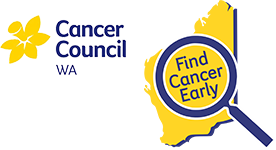Call out for cancer survivors
It’s important for people in regional areas to visit a doctor, clinic nurse or Aboriginal health worker as soon as possible if they notice any unusual changes in their body.
This article was written by Nicole Salmeri and was published in the Bunbury Herald on 17 December 2019.
Cancer Council WA is calling on South West people who have had lung cancer to help with the new Find Cancer Early campaign.
The campaign aims to reduce the cancer survival disparity between regional WA people and those living in Perth by increasing community awareness of symptoms of the five most common cancers.
Cancer Council WA’s South West regional education officer Shenae Norris, pictured, said the campaign relied on champions sharing their survival stories to motivate people to seek medical advice early if they have symptoms.
“Find Cancer Early champions have a lived experience and so their messages are really encouraging,” Ms Norris said.
“We have some wonderful champions in the South West who help us raise awareness of bowel, breast, prostate and skin cancer symptoms, but unfortunately due to the low survival rate of lung cancer, it can be quite difficult to raise awareness of the lung cancer symptoms.
“The earlier cancer is found the greater the chance of successful treatment and regional West Aussies are already up to 30 percent less likely to survive cancer than their Perth metro friends.
“It’s important for people in regional areas to visit a doctor, clinic nurse or Aboriginal health worker as soon as possible if they notice any unusual changes in their body.”
The recent Find Cancer Early campaign evaluation results identified one of the main lung cancer symptoms, becoming more short of breath, was among the least known symptoms of cancer in regional WA.
Other common symptoms of lung cancer include coughing or spitting up blood even once, a cough that lasts for three weeks or more, worsening or changing of a long standing cough, repeated chest infections, tiredness or lacking energy, unexplained weight loss, persistent chest or shoulder pain, abdominal or joint pain, difficulty swallowing and loss of appetite.
People who know of someone who has had lung cancer and might be willing to help Cancer Council WA are asked to contact Dot’s Place Bunbury.
